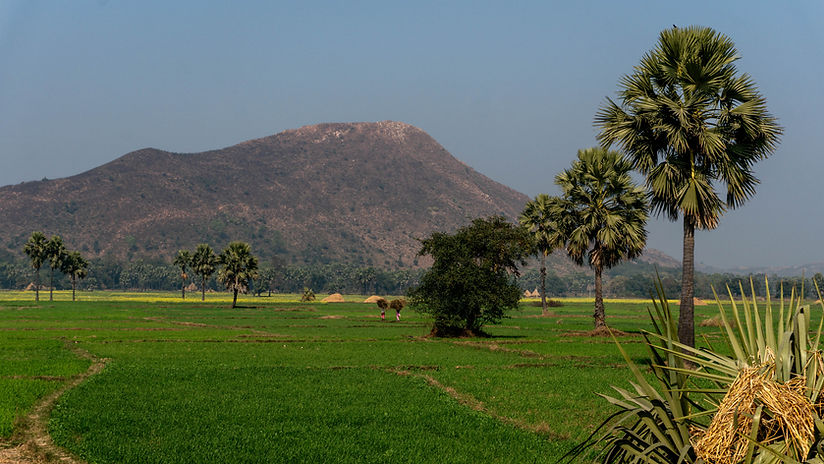
PORTRAIT 10
Penny George, Sean Malone and Wendy Wornham
Fifteen years of shared values
For over fifteen years, the George Family Foundation (GFF) has been a loyal supporter of Karuna-Shechen. On the occasion of the foundation's 30th anniversary and Karuna-Shechen's 25th, we wanted to look back on the unique bond of trust that unites us, and the shared values and motivations that inspire our actions.
Catherine, Director of the Philanthropists Circle, brought together three committed voices: Penny George, co-founder of the George Family Foundation, Sean Malone, President of the GFF, and Wendy Wornham, who is now President of Karuna-Shechen USA, and has also been a volunteer translator for seven years.
Hi Penny, Wendy, Sean. I’m so glad you’re all meeting each other.
Wendy: Penny, Sean, it’s such a pleasure to meet you! This morning, I spent an hour and a half watching your foundation’s 30th-anniversary symposium, and it deeply resonated with my own journey.
Penny: How interesting. What parts resonated most?
Wendy: The idea of whole-person well-being and integrative medicine. In 1976, as a first-year med student at Harvard, I found myself immersed in learning the science of how the body works with minimal attention to the context in which healing is practiced and health care is delivered. In the Human Biology courses I had taken as an undergrad at Stanford we learned about the influence of environmental, political, economic, historical and cultural factors in health and illness.
Penny: I love that it resonated with you. Integrative Health and Healing was the foundation’s first major focus area, working collaboratively to empower people to take charge of their health and wellbeing — so that everyone can flourish in their lives. On the practitioner side, we’re very interested in a model of healthcare that places the individual at the center. Since this clearly became a priority for you too, how did you manage to incorporate this approach into your studies back then?
Wendy: Well, at the time, along with a small group of classmates, I began hosting “alternative medicine” luncheons to explore a more holistic vision. Midway through my third year, I knew I needed to learn more about other healing systems and public health; : Harvard awarded me a grant, and I spent a transformative year in Nepal studying Ayurvedic medicine, consulting for USAID, and then working in a Cambodian refugee camp in Thailand. Returning to Harvard, I shaped my residency around clinical pediatrics, psychiatry and public health. In addition to integrative health, how did you shape the purpose of your foundation?
This awareness shaped the way I practice medicine, and I consider generosity and compassion to be as important as scientific knowledge.
Penny : Je suis ravie que cela vous ait parlé. La santé intégrative a été le tout premier axe d’action majeur de notre fondation : travailler ensemble pour permettre aux personnes de prendre en main leur santé et leur bien-être, afin que chacun puisse s’épanouir pleinement dans sa vie. Côté praticiens, nous nous intéressons beaucoup à un modèle de soins qui place l’individu au centre. Puisque cela est aussi devenu une priorité pour vous, comment avez-vous réussi à intégrer cette approche à vos études à l’époque ?
Wendy : À l’époque, avec un petit groupe de camarades, nous avons commencé à organiser des déjeuners autour des médecines alternatives, afin d’explorer une vision plus holistique. À mi-parcours de ma troisième année, j’ai ressenti le besoin d’approfondir ma connaissance d’autres systèmes de soins et de santé publique. Harvard m’a octroyé une bourse, et j’ai passé une année transformatrice au Népal à étudier la médecine ayurvédique, à travailler pour USAID, puis dans un camp de réfugiés cambodgiens en Thaïlande. De retour à Harvard, j’ai construit ma résidence autour de la pédiatrie clinique, de la psychiatrie et de la santé publique. En dehors de la santé intégrative, comment avez-vous défini la mission de votre fondation ?



Penny: My husband Bill and I were very aligned about what we wanted to achieve with the George Family Foundation, and articulated a mission to foster wholeness in mind, body, spirit, and community by developing authentic leaders and supporting transformative programs serving the common good. That’s why we’ve been so pleased to support Karuna, which has been so effective in serving the common good.
And you have been supporting Karuna for 15 years now, which we are so grateful for.
Penny: Well, the foundation is committed to supporting exceptional leaders, and Matthieu is just that — an exceptional and deeply authentic leader who puts everything into Karuna’s projects.
Wendy: Yes, I think Matthieu's influence as a “North Star” is indisputably essential and inspiring and it’s what keeps us all going.
Penny: We’re also moved by the compassion and altruism inherent in Karuna’s work — and, of course, the quality of your programs. Your initiatives deliver swift, heartfelt impact, where modest grants can make a great impact. The way you work with attention to the dignity of the people that you're serving and all the dimensions that make life a whole. It’s extraordinary. This is why we have been supporting Karuna all these years.
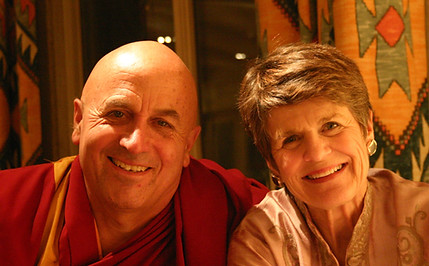
Penny with Matthieu Ricard
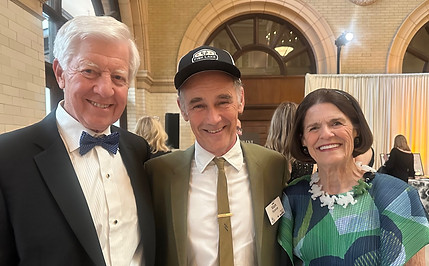
Guthrie Theater event honoring Penny and Bill George along with actor Sir Mark Rylance.
Sean, is Penny’s approach to Karuna’s work similar to how she leads the Foundation as Board Chair in general?
Sean: That’s a great question. Penny is a wonderful leader, and she leads by example. All the Foundation’s giving is rooted in authenticity. The goal is to have an impact, but that impact isn’t about statistics alone; there’s a fundamental desire for connection, compassion, and empathy. One of the things that strikes me most — and that the whole family talks about this — is the idea of a spiritual reciprocity between donors and recipients.
That philanthropy is not a one-way interaction: it's a circle of meaning and impact. It's not about a benevolent giver and a recipient, but an ecosystem of people striving to make things better.
Sean: That’s a great question. Penny is a wonderful leader, and she leads by example. All the Foundation’s giving is rooted in authenticity. The goal is to have an impact, but that impact isn’t about statistics alone; there’s a fundamental desire for connection, compassion, and empathy. One of the things that strikes me most — and that the whole family talks about this — is the idea of a spiritual reciprocity between donors and recipients.
Yes, and this notion of reciprocity is connected to the question of trust, which is crucial in philanthropic partnerships such as ours.
Penny: Well, the foundation is committed to supporting exceptional leaders, and Matthieu is just that — an exceptional and deeply authentic leader who puts everything into Karuna’s projects.
Wendy: Yes, I think Matthieu's influence as a “North Star” is indisputably essential and inspiring and it’s what keeps us all going.
Penny: We’re also moved by the compassion and altruism inherent in Karuna’s work — and, of course, the quality of your programs. Your initiatives deliver swift, heartfelt impact, where modest grants can make a great impact. The way you work with attention to the dignity of the people that you're serving and all the dimensions that make life a whole. It’s extraordinary. This is why we have been supporting Karuna all these years.
What inspires you most in what our colleagues share during these meetings?
Wendy: I’d say it is the way Karuna works: the partnering with communities, the desire to empower villagers, and the holistic approach. This mirrors how multiple concerns intertwine: environmental protection, education, women's health, economic development, medical services… It’s not good enough to just deliver medicines and bandages to health care centers if people can’t get there, and there are also additional opportunities to provide relevant information about programs that can ameliorate the lives of villagers. We have also teamed up with a few organizations in Nepal that are doing some fabulous things.
For example, Dr Ruit, who runs the Ruit Foundation, performs thousands of cataract operations in very remote areas. We wanted to support him, and were able to use some of the funds we received from donors to give him a three years grant.
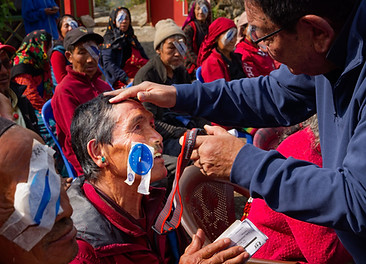
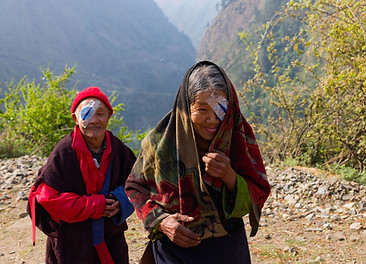
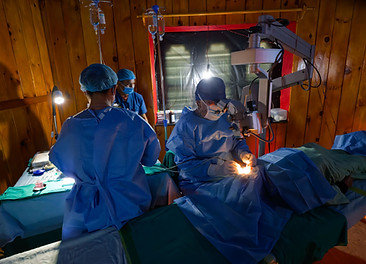
Penny: That’s wonderful. At the George Family Foundation, we believe that true, sustainable change arises when communities are empowered to define and pursue their own priorities. People support what they help create.
It is really great that our organizations match so well and therefore formed this lasting partnership around shared values. And it’s also true of people as well I believe. For instance, Wendy, Penny, you had never met before this conversation, and yet something seems to have clicked between you.
Penny: I feel like I've met a kindred spirit, Wendy. And I would love to stay connected with you!
Wendy: I feel the same way! When I was listening to interviews you’ve given, I thought, “Wow, she's something!” I really would like to meet and get to know about you.



_edited.jpg)
